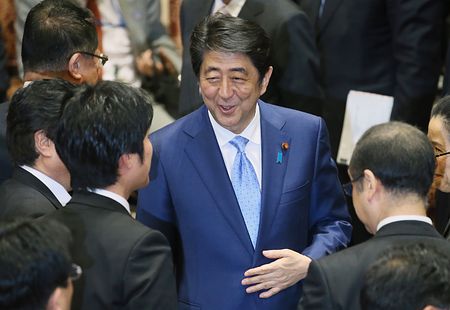Interest
Prime Minister Abe: Dōjinshi Safe Under TPP
posted on by Eric Stimson
The Trans-Pacific Partnership (TPP), a trade agreement signed in February between 12 Pacific Rim nations (Australia, Brunei, Canada, Chile, Japan, Malaysia, Mexico, New Zealand, Peru, Singapore, the United States and Vietnam), has long unsettled manga and anime fans because its intellectual property provisions could reclassify dōjinshi as non-shinkokuzai, meaning that their creators could be prosecuted without the consent of the holders of the copyrights they have violated. However, a statement by Japanese Prime Minister Shinzō Abe on April 8 has clarified the matter in a way that should set fans at ease.

"Dōjinshi don't compete in the market with the original works and don't damage the original creators' profits, so they are shinkokuzai," he explained. "So that fan-made work like parodies don't wither away, we're limiting [non-shinkokuzai] to things that earn profits, wholly appropriate the original work, and inappropriately damage the rights holders' rights — they must fulfill all of these conditions."
While the TPP has been signed by all 12 participants, its future remains uncertain, and the front-runners in the American presidential race oppose its ratification. The agreement's intellectual property provisions have caused concern from noted dōjinshi supporter Ken Akamatsu and legal expert Kensaku Fukui.
Abe's remarks followed a meeting of the Committee on Intellectual Property to explore ways to strengthen and clarify Japan's laws on copyright infringement. In particular, it focused on video hosting sites. The committee is considering the disclosure of the identities of illegal website managers, the shutdown of their websites, and their removal from search engine listings. While video hosting sites currently exist in a gray zone, since they usually derive their revenue from ads rather than selling illegally obtained materials and since their main purpose is simply hosting videos, an investigation has shown that the majority of illegal videos are watched through these sites. The committee identifies illegal websites as "those who link to a large quantity of illegal copies for purposes of profit," and "those who continue hosting illegal copies despite being warned" will face the new disciplinary measures.
Google has downgraded the search listings of copyright-violating websites since 2012. Downloading copyrighted material without authorization has been illegal in Japan since 2009.
[Via Jiji.com and Yomiuri Shimbun]